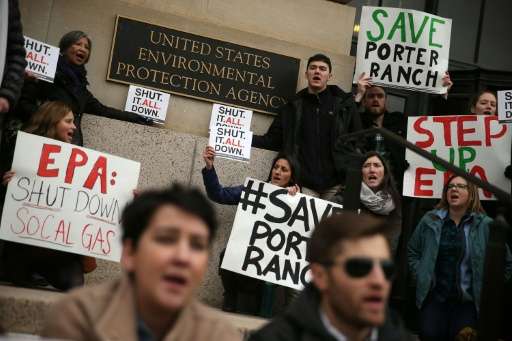Volkswagen, Flint point to weakness in US environmental protections

Two recent scandals in the United States—one involving Volkswagen's diesel cars, the other, contaminated tap water in Flint, Michigan—appear to have little in common at first glance.
But the controversies involving the German car maker's rigged exhaust systems and the beleaguered Midwest city's heavily-contaminated drinking water share a common link: Both expose shortcomings in America's environmental protections.
Coming several months apart, the two scandals followed similar patterns: government regulators missed a serious violation of environmental laws and only found out from members of the public.
In the case of Volkswagen, it was a non-governmental organization, the International Council on Clean Transportation (ICCT), which brought to light that the huge German automaker had installed illegal software on its diesel cars to allow them to fool pollution testing devices.
That permitted VW's 600,000 diesel cars in the United States to spew amounts of poison exhaust gases some 40 times the legal limit into the air without officials knowing about it.
It was the ICCT's work which drove the government's regulator in charge of testing car and truck emissions, the Environmental protection Agency, to take action against VW in September.

More recently, regulators have been embarrassed by the scandal in Flint, where officials had claimed that the public water system produced water wholly safe to drink.
In this case, it was a local mother who brought the truth to light.
After her family appeared to suffer various ailments from the city water flowing into her home, LeeAnne Walters obtained a test that showed extremely high levels of lead in it. Only after she pushed the information to the EPA did the agency begin to take action.
How could these failures of public regulators happen?
The EPA, created by president Richard Nixon in 1970, has now taken action in both cases. It threatens to fine Volkswagen billions of dollars and is supporting civil and criminal investigations into the company.
In the case of Flint, the EPA removed its local head and has since become more involved in dealing with the water problem.
An EPA spokeswoman said that in Flint, the agency's work "was impacted by resistance and failures at the state and local levels to work with EPA in a forthright, transparent, and proactive manner consistent with the seriousness of the risks to public health."

She said the agency had "repeatedly" said what needs to be done, but actions "were not taken as quickly as they should have been."
As for the Volkswagen case, the EPA said that, using what it learned from the ICCT, it uncovered more violations by the automaker.
Political interference
But there are still questions about why the agency itself failed to catch the violations initially.
According to Greenpeace, the United States is paying for repeated political attacks on the EPA, which Republicans say is a barrier and burden to business.
"The agency is spread very thin and has constantly been facing budget cuts by the Republican Congress," said Greenpeace official Rick Hind.
"They have to rely on community leaders and activists to learn about violations of the law."

Since 2010 and the Republican ascendance to power in the Congress, the EPA budget has been slashed by more than 20 percent, to $8.1 billion, and the staff has fallen by 11 percent even as its responsibilities continue to expand.
Another problem is the division of duties in the United States.
Implementation of some environmental laws is often in the hands of local authorities. Some can be quick to report violations, while others—not so much.
"A lot of issues crop up when state regulators self-report to the federal level. There can be some withholding of information and a lack of follow-up," according to Gregory DeGulis, a lawyer specializing in the environment.
Civil society groups then have to take up the slack, and major US environmental laws, those for air and water quality, for example, give citizens the right to take legal action over pollution violations.
In 1993, a California legal secretary, Erin Brokovich, brought to light the contamination of public water resources by a major corporation in her town. Her story became a hit movie.
"It's a critical backstop," said Robert Percival, a professor of environmental law at the University of Maryland.
"The government agencies are the first frontline of defense. But when they fail to do their job, civil society can come into play."
The basic fact is that the number of government investigators can never match the number of businesses under regulation.
The government can't be everywhere, notes Cary Coglianese, a law professor at the University of Pennsylvania.
"It's just not possible, even with the most generous budget" to do all the work needed.
But citizens often do not have the technical ability to do the job. And when they do discover problems, they can run into resistance from bureaucrats—as they did in Flint—when they do raise the alarm.
When violations are pointed out, official regulators "sometimes take it personally, as a criticism that they're not doing their job properly," noted Coglianese.
© 2016 AFP


















